Born in Belgrade as Vesna Bjelogrlić, she was a brilliant student of literature who had only one wish: to be a poet. Love led her to London, where she received her doctorate and got married, and where she today has a career as a distinguished university professor and respected writer and poet. A fellow of the UK’s Royal Society of Literature, she is proud of her Serbian identity, just as she was back in the 1990s, when the UK and Serbia were all but at war. The UK feels like her second homeland. Many aren’t that fortunate
From the instant, on 8th April, that she received this year’s Momo Kapor Award for Literature for her novel The Iron Curtain: A Love Story, writer Vesna Goldsworthy (born 1961) won over countless new readers, to add to those who’d already come to appreciate and love her for her previous works. After a long absence from her hometown, the occasion of the award ceremony brought her back from London, where she’s been living since the age of 24. It was in Belgrade that she completed her studies in Yugoslav and general literature, before going on to receive her doctorate in London. She’s published a dozen books of prose and poetry, works as a university professor and is a member of the prestigious Royal Society of Literature.
As she herself explains, she was raised in a harmonious and statistically average family in Belgrade: two parents, two children, a 40-square-metre apartment in Mirko Tomić Street in the Dedinje neighbourhood, followed by a move to a house in Žarkovo once that apartment became too cramped for the family. She recalls the Skoda cars in which the family would cruise every summer, across Yugoslavia, Italy, Greece:
“Dad would drive, for example, via Gorski Kotar to Opatija [in Croatia], or take the highway to Athens. He would sing Russian songs, chant canzones, sevdalinkas [Bosnian sevdah folk music], whatever crossed his mind. Me and my Mum and sister would perform backing vocals. I described my fondest memories in Chernobyl Strawberries, but even an entire book wasn’t enough. It’s been translated everywhere from Portugal to Poland, with 15 editions in Germany alone, as well as serialisation, both on the BBC and in The Times, that was followed by more than a million Brits. Memoirs that reveal deep childhood traumas beneath a glossy surface are now popular, but I didn’t experience such traumas. I had wonderful parents and grew up during a time when it seemed that a much better future awaited them, my city and my country. That faith in the future is perhaps my most precious memory. We no longer have that.”
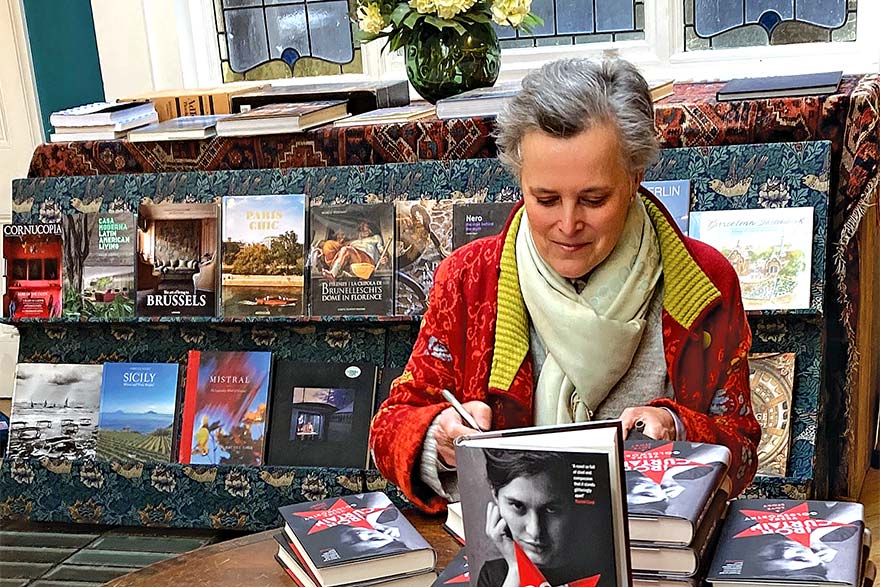
Vesna’s maiden name is Bjelogrlić. And the Bjelogrlićs all originate from the Bosnian village of Lipnik, near the border with Montenegro.
She describes that part of Herzegovina as a beautiful, sunny version of Scotland, where she put her heart and soul into hiking:
“My grandfather, Petar Bjelogrlić, came to Belgrade as soon as World War I ended. His story is like a novel. He was a railway station porter, laboured at the Julino Brdo quarry, then acquired land and property that were in large part nationalised in 1945. He started from scratch three times. Born a subject of the Ottoman sultan, he grew up in Austria-Hungary and died in Tito’s Yugoslavia.”
When I won some poetry competition in high school – I can’t recall now whether that was in Kikinda or Vrbas – Desanka Maksimović was on the jury and mentioned me as her successor. I only discovered that many decades later, in a note written by my dear friend Pero Zubac
In her memoir Chernobyl Strawberries, Vesna described her parents – slightly in jest, but partly to familiarise British readers with her childhood – as socialist yuppies of Tito’s Yugoslavia. Her father and mother both had a university education and were both in the first generation of their families to earn a university degree. Their greatest ambition was for Vesna and her sister to become more than that. She developed an awareness very early on that the ideal was a master’s degree, a doctorate or a career in scientific endeavour, as something that she should have strived for even more than writing poetry:
“And I was already writing poems at the age of four and talking about how I wanted to be a poet. My dad graduated from the Faculty of Natural Sciences and Mathematics while he was also working, so he taught me to read and write while preparing for exams with me sitting beside him. I learned my first letters at the age of two and a half – P-o-l-i-t-i-ka – spelling them out from newspapers on the table and not from a spelling book. As a family ideal, but also an ideal of then Yugoslav society, having a rounded education was much more important than becoming rich. They sent us for private language classes, and my sister also had music and ballet classes, as she had an aptitude for that. Speaking on one occasion much later, my mother said with great sadness – as I recounted in Chernobyl Strawberries – that they sacrificed a lot so that my sister and I could speak French and English, and that it was actually languages that finally propelled us out into the world and far from our parents.”
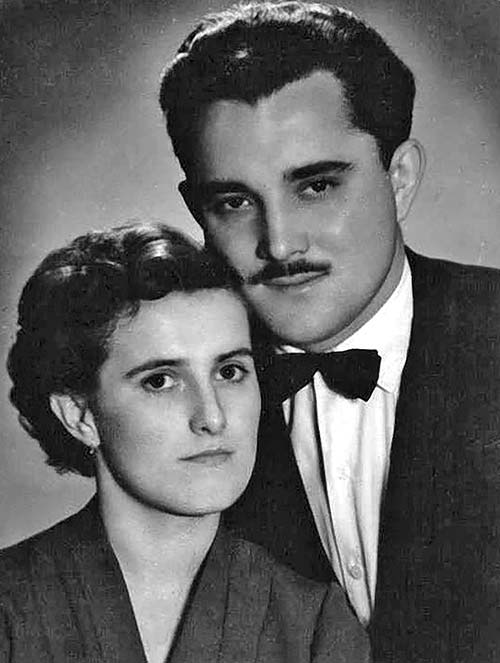
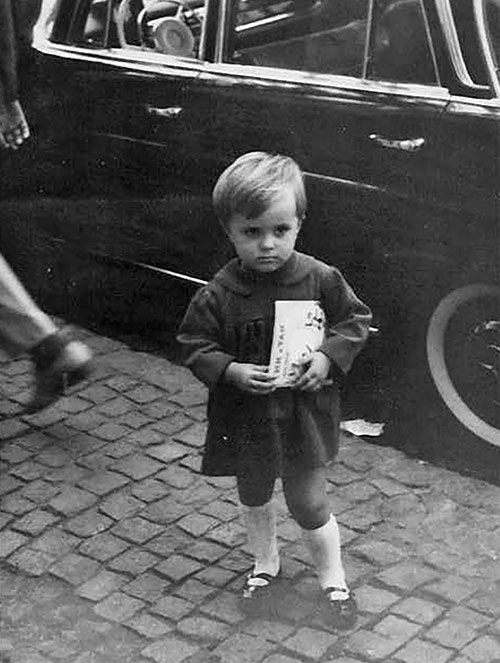
And how much did Vesna’s home upbringing differ from what was sought and demanded at school?
“During the ‘60s and ‘70s, the school system had a really ideological tone, but we knew from a very early age that in the family, between those four walls, we discussed things that weren’t mentioned at school. My maternal grandfather was struck by misfortune after the war, when a large part of the family property was taken from them. He was also imprisoned. He couldn’t watch Tito on the TV news bulletin without swearing. One of my uncles was an officer in the Yugoslav Royal Army who spent the entire war at a POW camp in Germany, then later became a sports administrator. While my father was a member of the Communist Party, due to the nature of his work as a civilian serving in the Yugoslav National Army, my mother would note with pride that she didn’t want to touch the Party. These were all very political stories that adults knew about but didn’t discuss openly with children. My schoolmates were from families of all political persuasions and it was often much later that we learned their stories. That’s perhaps the biggest difference between me and my British contemporaries.”
Of all the subjects at school, Vesna’s favourite was the Serbo-Croatian language and literature. She adored every teacher of that subject. She’s been devouring books since she was a little girl, and she did so with such speed that she received a certificate for the most books read every year. Back then, books weren’t bought in the way they are today, which is why a large part of her children included the world of libraries and librarians:
“When I opened the Belgrade Book Fair on behalf of the UK, as the guest country, almost 20 years ago, those who turned up for book signings didn’t only include my teacher of Serbo-Croatian literature from high school, but also local librarians from two Belgrade neighbourhoods who still remembered me! I was a Vukovac [a straight-A pupil worthy of Vuk Karadžić], with good grades in all subjects, but I had a problem with some practical fields. One was gymnastics – I was fairly ungainly, though I found it easy to compete in team sports – and the other was so-called general technical education. Everything I made in those classes was crooked and wobbly.”
My intellectual mission is to dismantle prejudices, not to hide historical and political facts
Vesna’s first true literary loves were from the order of poets: Crnjanski, Dis, Rakić, Eliot, Rilke, Akhmatova. Then later contemporary Greek poets: Seferis, Elytis, Cavafy. They had a huge influence on her early verses. She had notebooks in which she would transcribe her favourite poems. She took them with her to London and still reads them today like some sort of personal anthologies: “I think I knew two thirds of Crnjanski’s poems by heart in high school. Lament over Belgrade, Dis’s Nirvana – those verses still cross my mind today as I stand in a queue or travel on the Underground. I wrote a poem about my childhood love for T. S. Elio
that was published by the London Review of Books, and it was very pleasing when I saw that little girls were transcribing its verses and posting them on Instagram, as some modern-day versions of myself and my volumes. Among prose writers, alongside Crnjanski, there was also Meša Selimović. I underlined so many passages in my copies of Death and the Dervish and The Fortress that my father teased me by suggesting that it would be quicker to underline the parts I don’t like. It was while at university that I entered the world of Russian classics, which I still haven’t left, though during my time in England I’ve grown accustomed to reading them in the original Russian. Although the English translations are more than excellent, the melody of the language is something else – I couldn’t imagine reading English classics in Serbian anymore.”
Her parents had wanted her to study medicine. During the time of the socialist Yugoslavia, that was perhaps the most prestigious career beyond the political sphere for good students. However, for her there was never an alternative option to literature. That was all she wanted to study even before she went to primary school, though back then she dreamt of becoming a poet, without ever wondering how poets earn a living:
“When I won some poetry competition in high school – I can’t recall now whether that was in Kikinda or Vrbas – Desanka Maksimović was on the jury and mentioned me as her successor. I only discovered that many decades later, in a note written by my dear friend Pero Zubac, who I’ve known since those years. That was really my whole world. From the instant I turned towards a career in literature, the best possible result for my parents would have been an assistant professor’s position, a university career. Given that I’d studied Yugoslav and world literature, it seemed that my departure to England represented the culmination of that journey. They often cited Crnjanski himself as an example, because he’d attempted, among many other things, to earn a crust working at some English university: if such a great writer as him hadn’t succeeded, what was I hoping for? Paradoxically, I spent five years as department head at one of the universities that had turned him down.”
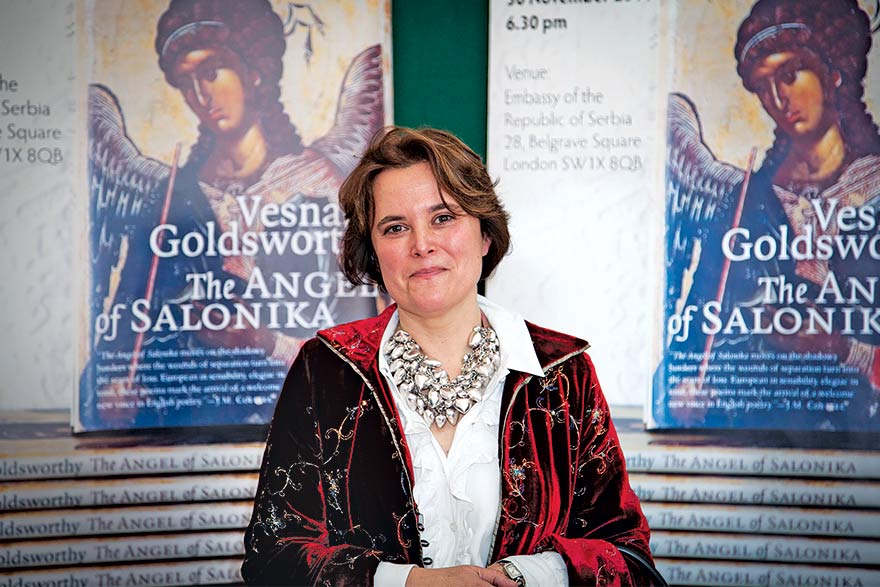
Youth, madness, love and, above all, great courage. Those were the crucial factors that determined her move to England. Upon completing her studies in Belgrade, she received a scholarship for postgraduate studies in France, so she decided to spend that summer in Bulgaria, finalising her graduate dissertation. The University of Sofia had a summer language school back then, which was attended by young Slavicists from all over the world. It was there that she met her future husband: he was studying Balkan and Central European history. Instead of heading to France, she soon accompanied him to England, to the horror of her parents. Not because they had no love for their daughter’s future husband – they didn’t really even know him then – but because of the unbelievable scope of their daughter’s decision:
“Nothing was tough for me initially, except my mother’s great sorrow. My husband’s family accepted me immediately and unreservedly, both my father-in-law, who hails from a colonial military tradition, and my motherin- law, who comes from a family of writers and intellectuals. I was in a beautiful house on the Atlantic coast, travelled to Kenya for my honeymoon, and soon afterwards found myself cruising the length and breadth of North America, from coast to coast. As I’d already toured the whole of Europe from Yugoslavia via interrail, I now saw myself as a great world traveller. It was only after a few months that I was “rocked” by the reality, like in Crnjanski’s novel, of a deep sense of loneliness: everything that I’d left behind in Belgrade, networks of friends and family, charted paths. It took a long time for me to recreate that from scratch in a new place and a new language, but I nonetheless succeeded. I really feel like Britain is my second homeland. Many aren’t that fortunate.”
There were really many instances during the 1990s when Serbs were unfairly tarnished in the British media, but I didn’t shut my eyes and pretend not to see when they caused harm to others
Vesna worked in publishing in London during the ‘80s, employed at small academic companies where she was the only foreigner, with her ‘exotic’ status representing a kind of advantage. It was a year before the first conflicts erupted in Yugoslavia that she switched to work in radio, and perhaps things would have been better if she hadn’t, because there she couldn’t bury her head in the sand to avoid seeing what was happening:
“Much of my work at the BBC was paradoxical. That was the first time in London that I found myself surrounded by our people and the Serbian language, because – with a few exceptions – I worked in the Yugoslav editorial department as a producer and translator. Those were wonderful people. Pekić came often to record his letters from abroad. However, it was then that I became aware that I’m not a political journalist and never want to be. I wrote in Chernobyl Strawberries about the fact that I was working the night shift when Operation Storm began in August 1995. I read the news, locked myself in the toilet at Bush House and cried.”
She never felt uncomfortable in England as someone from Serbia. On the contrary:
“I’m proud of my roots, as I was during those moments of the 1990s, when the UK and Serbia were all but at war. However, that doesn’t mean that I needlessly idealise my nation. My intellectual mission is to dismantle prejudices, not to hide historical and political facts. There were really many instances during the 1990s when Serbs were unfairly tarnished in the British media, but I didn’t shut my eyes and pretend not to see when they caused harm to others. When NATO launched its bombing campaign in 1999, my mother-in-law wrote protest letters to the parliament and linked up with MPs who opposed that intervention. That’s something that touched me deeply, because she’d barely known where Serbia was before I came along.”
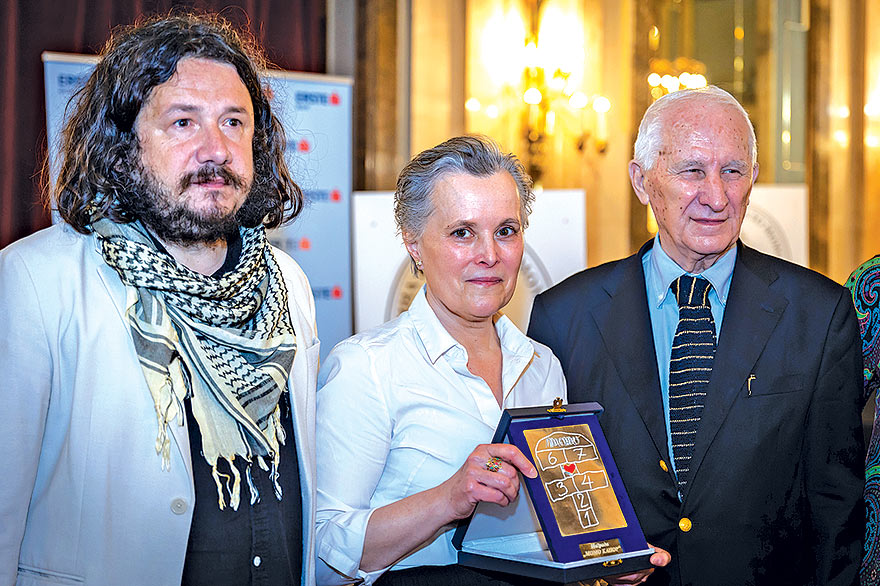
The Goldsworthys, whose surname Vesna took when she married, also have an interesting story. The name is originally Cornish, from the beautiful, rugged region of Cornwall in southwest England that’s traditionally home to many mariners. One of the ancestors of Vesna’s husband was an officer on the HMS Bellerophon, the ship that carried Napoleon into exile. Like Herzegovinians, the Cornish people also traditionally married late, thus lengthening generational divides. In the mid- 19th century, the great-grandfather of Vesna’s husband, Walter, headed to India with his brother, only to return as a general. Walter spent a long time as a member of the British Parliament, while his brother served as the governor of Western Australia, Honduras and the Falkland Islands:
“I wrote a travelogue about their years in India, just a few pages, which was included in a couple of important anthologies here. The idea of a Serbian woman alone in Calcutta searching for the house of imperial ancestors is sufficiently peculiar even without the fact that my critique of British imperialism is obligatory university reading. My mother-in-law, on the other hand, hails from a very different family that produced a couple of interesting writers in the 19th century (her great-grandfather, Sabine Baring-Gould, was a friend of George Bernard Shaw and allegedly the inspiration behind the character of Professor Higgins in Pygmalion).”
Speaking on one occasion, Vesna noted: “Me and my husband, an Englishman, have much more in common in our family history that unites us than separates us: I believe that this also applies to our countries of origin.”
There is a similarity in the mentality of the Serbs and the English; the idea of a nation that has always been on the right side of history in wars. My husband and I both had grandparents, or great-grandparents, who fought on the Salonica [Macedonian] front in World War I
And does this still apply today? “There is a similarity in the mentality of the Serbs and the English; the idea of a nation that has always been on the right side of history in wars. My husband and I both had grandparents, or great-grandparents, who fought on the Salonica [Macedonian] front in World War I. World War II is more complicated. My husband’s ancestors were in India and Africa at the time, and mine were too old for combat, while different parts of the family were under Bulgarian, Hungarian and German occupation, with close relatives held in captivity in Germany. The British never experienced occupation and that’s why they sometimes lack understanding for the rest of Europe. We were formally still allied with the British, though I wrote about that with a dose of humour. Whether Churchill was our ally or abandoned us remains an open question for my Belgrade family. We are now heading in opposite directions – with Britain having left the European Union and Serbia aspiring to join it – but views on this issue are very similar in my Anglo-Serbian family.”
How possible is it today to be a writer in the East or the West and to avoid the political divisions that are becoming increasingly drastic, especially during this time of conflict between Russia and Ukraine? Vesna says that it’s becoming increasingly difficult to speak openly in public and to express one’s opinion on anything without being afraid that the debate will quickly become unpleasant:
“It’s not only that the divisions are more drastic, but that the people are becoming more aggressive, more ready for uproar and rage. Everything is binary, you’re either with us or against us, and it’s not in my nature to think like that – not only as a writer, but also as someone who works at universities. And in the meantime, we’ve all become much more accessible and available than we were before. I’ve had plenty of experience with that, because everyone can find my university email address: from adoring fans who’d like to take me out to dinner, to those who need a “Serbian lady on call” to complain about Serbian politics as if I run those policies from my English cabinet.”
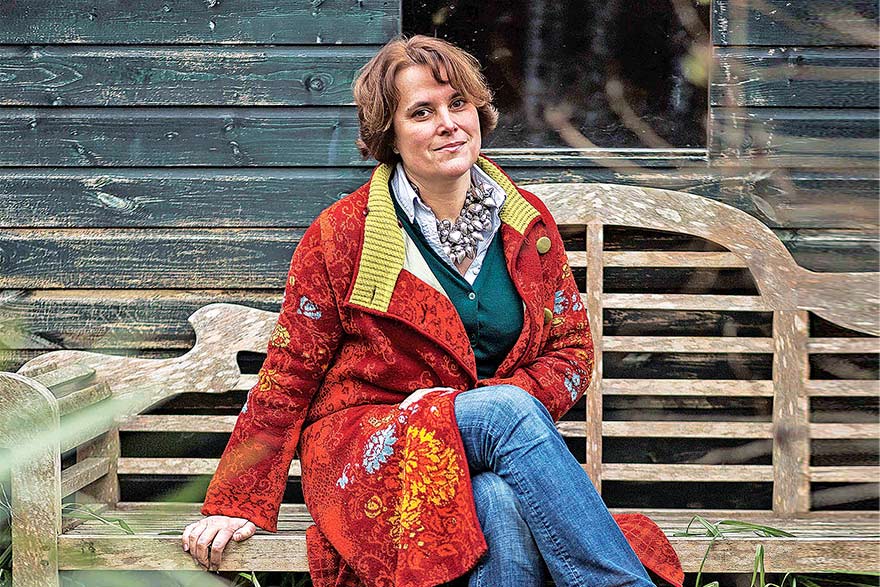
When it comes to the question of the beautiful aspects of her life and work in London, CorD’s interlocutor first notes that London is an enormous city:
“I think it’s over 70 kilometres from one end to the other. We often live in a certain neighbourhood without going to the city centre for days. The West End of London where I live, beside the Thames, close to large parks and woods, is really beautiful. I walk and ride my bike every day, forgetting that I’m in a big city until the evenings when I go to the theatre, opera, or a restaurant. I also work at two universities in two different parts of England, which is itself a special experience. Exeter is more than 300 kilometres from London, and it takes me two hours by express train to get there. I leave in the morning, give lectures and consultations, then return in the evening. I most like to write on that morning train, while chugging through areas of greenery. In the evening, feeling tired, I dine in the dining car, sometimes with a small glass of champagne, sometimes with a cup of tea, as scenes of beautiful English landscapes roll by the window. The vast majority of English people travel to work in the opposite direction, from small towns to major cities, so I have the huge advantage of quiet – in half-empty carriages. There I’m finally here alone and at peace.”
And one interesting fact to conclude Vesna’s story. The Momo Kapor Award is the first award that she’s ever received in her home country. And that makes it even more precious to her. She didn’t know Momo Kapor personally, but as a high school pupil she devoured everything he wrote at the time. The Momo Kapor endowment, which was founded by Ljiljana Kapor, the wife of this great writer and painter, was joined this year by Erste Bank, as the patron of the Momo Kapor Award.